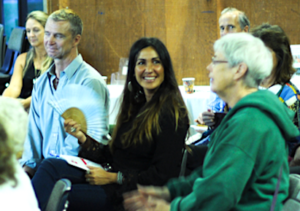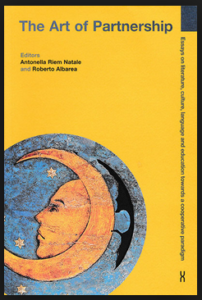Because the Partnership/Domination scale is interdisciplinary and cuts across academic siloes, scholars worldwide use and teach the Partnership/Domination social scale as a foundational concept. Scholars from natural and social sciences as well as humanities utilize the psycho-social macro-historical analysis provided by Riane Eisler's research, and teach the interventions it shows are needed for a better society. This multidisciplinary research points to actions that can improve not only our knowledge but our lives and future.
Examples of Scholarship Inspired by Riane Eisler's Work
The Interdisciplinary Journal of Partnership Studies is a peer-reviewed, open-access, online journal housed at the University of Minnesota. Scholars and practitioners come together to share knowledge and experience, to develop new fields of inquiry, and provide practical tools to better address our unprecedented personal, social, economic, and environmental challenges. Scholars from any field and their students are invited to submit articles related to partnership studies to the Interdisciplinary Journal of Partnership Studies.
Contribute an Article to the Journal
- Inspired by the work of Riane Eisler, Professor Antonella Riem and a group of researchers at the University of Udine (Italy) founded the Partnership Studies Group (PSG) in 1998. This active community of scholars has partners all over the world: initially, the group's research focused on the literatures of Australia, India and Canada, applied linguistics and education, but it has expanded to include a range of intercultural studies, francophone literatures, and social and educational fields.
- The Health Innovation and Leadership Speciality of the University of Minnesota's Doctor of Nursing Practice Program founded by Professor Teddie Potter uses partnership/domination theory as a key framework for its curriculum.
- Scholars at the Chinese Academy of Social Science in Beijing confirmed Eisler's cultural transformation theory in their multidisciplinary study of Asian cultural development, reporting their findings in The Chalice and the Blade in Chinese Culture, published and distributed both in English and Chinese in 1995.
- The noted Sumerian scholar Samuel Noah Kramer used Eisler?s theoretical framework for one of his last books, The Myths of Enki.
- In 1995, a special section of Pluriverso, a journal for European intellectuals published by Rizzoli, was devoted to Eisler's new theory, featuring her concept of gylany.
- The archaeologist Marija Gimbutas used Eisler's term gylany and Eisler's cultural transformation theory to advance her own interpretation of prehistory in her final work, The Civilization of the Goddess.
- The philosopher Mara Keller, the historian of myth Malcolm Godwin, and many others have used Eisler's Cultural Transformation Theory and Partnership and Domination Systems Theory in their writings about prehistory.
- Many university courses assign Riane Eisler's books and use the Partnership/Domination framework. Professors from diverse disciplines, including philosophy, history, political science, business, management, economics, and education, have woven the framework into their curriculum in schools ranging from The University of Alabama to The IE Business School in Madrid.
Leadership Stories
All around the world, professors from a range of disciplines are incorporating partnership theory into their curricula. Professors from diverse disciplines, including philosophy, history, political science, business, management, economics, and education, have woven the framework into their curriculum in schools from The University of Alabama to The IE Business School in Madrid. Here's one example:
 Integrating Partnership into a University Ethics Course
Integrating Partnership into a University Ethics Course
Dr. Jan Garrett, Professor of Philosophy at Western Kentucky University, shares how he integrated Riane Eisler's domination-partnership systems framework into an ethics course.
"I integrated Dr. Eisler's work into my general education Ethics course. The hope, of course, was that if people who had previously been taught to see morality and conduct chiefly through Strict Father or Domination lenses realized that there was another way of looking at the world, which had its own attractions, they might allow their own Partnership inclinations to come to the surface and practice them more consistently.
I hadn't taught the course in two years, and found this an interesting experience. Most of my students were taking the course as a prerequisite for entry into our university's nursing program, and at least 90 percent of them were women. They seemed a bit more predisposed to taking Partnership or Nurturant Parent thinking seriously than many of my previous students.
At the beginning of the course, I gave my students some charts copied from The Power of Partnership. Partnership v. Domination Patterns includes my remarks on how basic ideas from George Lakoff parallel Riane Eisler's thinking, a bibliography for Lakoff, and a link to a short Lakoff article that I encourage students to read. The main textbook was Judith Boss, Analyzing Moral Issues (5th edition). The first chapter includes excerpts from Nel Noddings, Aristotle, Kant, Bentham and Mill, Locke, and Ayn Rand. I interweave our discussion of those texts (saving Aristotle and Kant for later in the course) with comments on how the positions of the authors involved relate to Eisler's and Lakoff's conceptual frameworks.
Ethical Theories and Issues Through New Lenses collects the main points I made about some of the theorists and many of the more specific "applied ethics" type articles that are found in the Boss anthology. The point was to show the utility of Eisler's and Lakoff's frameworks as well as the interrelations between intellectual treatments of apparently disconnected issues.
I am also likely to introduce the Eisler and Lakoff paradigms in two upcoming philosophy courses: An Ethical Theory course (for majors and minors in Philosophy) and a new introductory general education elective, The Committed Life.
Guidance for College and Graduate Students
 As a student, you can use the work of Riane Eisler and support the partnership movement in addition to modeling partnership and moving through the world in partnership ways. Here are some specific examples:
As a student, you can use the work of Riane Eisler and support the partnership movement in addition to modeling partnership and moving through the world in partnership ways. Here are some specific examples:
- Bring partnership ideas and language into class discussion in all classes and in all formats. While it is important to do this respectfully (keeping the courses— and professor's—learning objectives in mind, and being careful not to take the conversation too far "off point"), making connections between partnership and other theories and coursework will deepen your own understanding of partnership while sharing it with others!
- Incorporate partnership ideas in written work for your courses as appropriate. (You may need to check with your teacher or professor about this first.) When partnership is shared with other class members and professors/facilitators, you might find the conversation shifting and deepening in new ways.
- Share partnership ideas on blogs, Twitter, and Facebook.
- Publish articles on partnership in magazines, social media sites, and peer-reviewed journals.
- Consider focusing on partnership in your capstone, thesis or dissertation.
- Foster a place for partnership in your school curriculum by contacting your department advisor/director and school administrators. Let them know how studying partnership in general and offering classes on partnership specifically are important to you. Share how partnership ideas have shaped your thinking, given you a more varied and improved skill set, and provided tools to apply in your current career/employment and life.
- When asked what you are studying, share ideas about partnership. Instead of just naming your discipline or field, share a few examples of what you are learning that also include partnership.
(Thanks to Dr. Susan G. Carter for contributing these suggestions for students. Dr. Carter teaches at the California Institute of Integral Studies and is a Consultant to CPS.)
Things to Do
Incorporate readings from Riane Eisler's books, or assign these books in your courses.
This has been done in classes ranging from psychology, sociology, and political science to economics, peace and conflict studies, and gender studies, as well as courses in nursing, literature and art.
Contribute an article to the Interdisciplinary Journal of Partnership Studies.
 Form a Partnership Studies group at your college or university
Form a Partnership Studies group at your college or university
One model for such a group is the Partnership Studies Group founded in 1998 by Antonella Riem and a group of researchers based at the University of Udine, Italy. It is an active, interdisciplinary community of scholars with a series of interconnected partners all over the world, all inspired by the seminal anthropological and socio-cultural work of Riane Eisler. The group has hosted conferences, contributes to an online journal, and has edited anthologies of scholarly work including The Goddess Awakened: Partnership Studies in Literatures, Language and Education, edited by Riem Natale, Luisa Conti Camaiora, and Maria Renata Dolce (2007) and The Art of Partnership: Essays on Literature, Culture, Language and Education Towards a Cooperative Paradigm. Group members have also published their own Partnership scholarship including The Rose and the Lotus: Partnership Studies in the Works of Raja Rao By Stefano Mercanti (Rodopi, 2009).
Develop new curricula and explore the possibility of degrees in Partnership Studies.
A number of dissertations and masters theses have been written using the Partnership-Domination social scale as their frame. These include areas ranging from education and leadership, to nursing, and spirituality. Riane Eisler has sometimes acted as an advisor.
Invite Riane Eisler to offer a course on cultural transformation at your university.
Most recently Eisler taught this course at the University of Alabama, Birmingham.
International Prize for Research and Study
Nominate a Scholar for the Partnership Scholars Award.
About the first recipient of the prize
Additional Resources
Understanding the Language of Partnership: A Glossary, created by Dr. Stefano Mercanti
Sample resources for college educators

